To Each his Own
Unit Three: School Life
3.4. To Each his Own
Word Bank | Phrase Bank | Communication Box |
Sewing Knitting Embroidery Choir Aerobics To relax | At break time after-school activities to be all for something to devote time to something to play computer games online to enjoy oneself to one’s heart’s content | To each his own. I prefer… to… I am keen on… I’m interested in… I adore… |
I. Conversation Warm-up
Read the notices and choose an after-school activity for yourself. Say why.

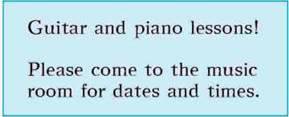
Example: I will choose guitar lessons because I’m keen on music.
II. Pronunciation
Read and practise the sounds /аv/, /ai/. Say what your favourite afterschool activity is.
MY LEISURE ACTIVITY
I want to paint a picture now,
Watch our teacher show us how.
First the paper big and white,
Then the colours very bright.
Now take the brush and water, too,
This is what I like to do.
Take my picture home with me
To let my dad and mummy see.
III. Function Smart
Read and learn how to express likes and dislikes. Look at the pictures and fill in the mini-dialogues.
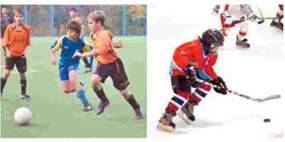
1) – There’s nothing like playing
– Really? I prefer… to… .
– OK, OK. Let’s agree to differ.
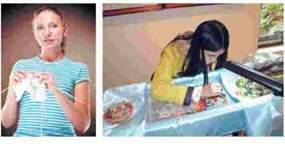
2) – I am keen on… and you?
– I differ. I’m interested in… . I’ve embroidered a shirt for my mum.

3) – I like to… after classes.
– In contrast with you I adore
–
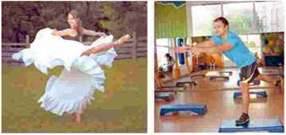
4) – I’m so fond of… .
– Tastes differ. I’m all for… . It develops my body and broadens my musical horizon.
IV. Word Smart
1. Look and say what after-school activities in the pictures (p. 88) the children prefer and why.
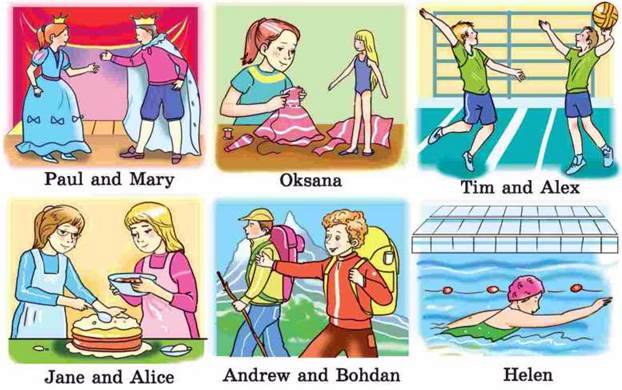
Sewing; | Swimming; | Drama; |
Travelling; | Cooking; | Sport |
Example: I think Paul and Mary like drama. They are talented children and have a head for it.
2. Read what Oksana’s English teacher Miss Joy says about after-school activities of English children and complete it with words and phrases from the box.
English schoolchildren have a lot of fun at break time. Sometimes they play… or… . All of them like their…. The boys go to the sports-ground and play… . Girls prefer… or… . Some schoolchildren spend their afternoons in the… . They watch… . It makes their life after school more… .

3. Answer the questions.
1. What after-school activities do you prefer?
2. How much time do you devote to your after-school activities?
3. Who of your friends share your interests?
4. How does your after-school activity differ from your friends’?
5. What after-school activities do most of Ukrainian children like? At home: Describe your favourite after-school activity.
Go to Ex. 49, 50 of your Workbook
V. Time to Listen and Read
1. Listen to / read in pairs and say what after-school activities Lucy and Paul prefer.
TASTES DIFFER
Lucy: We are free at last! Classes are over. Now it’s time to relax.
Paul: Agreed. We can enjoy ourselves to our hearts’ content. What are your plans?
Lucy: Firstly, I’ll do my lessons. Business before pleasure, you know.
Paul: That’s right. And then, what about going to the swimming pool for a swim or playing an adventure game online?
Lucy: Not me. A new quiz show starts at 5 p. m. on Channel Four and I am going to watch it.
Paul: What kind of quiz show is it?
Lucy: It’s a general knowledge quiz show “Mastermind”. Every time it deals with different areas, you know. It is going to be about wonders of the world. I’m interested in it, you know.
Paul: I’ll bet, you’ll be glued to the screen.
Lucy: Right. I never miss a chance of seeing it. Unfortunately, I don’t have much time for watching TV in the evening, because I have many other things to do like knitting or embroidering.
Paul: In contrast with you I prefer computers to TV. I’m keen on designing my own programme and I devote all my free time to it.
Lucy: To each his own.
Across Culture

Mastermind – популярне британське телевізійне шоу, в якому четверо учасників змагаються, відповідаючи на питання в галузі загальних знань.
2. Look at the pictures (p. 89-90) and say whose after-school activities they are connected with.


Example: Paul likes to play adventure computer games online after classes.
3. Say if you share Lucy’s or Paul’s ways of spending after-school activities. Give your reasons.
VI. Time to Communicate
1. Act as Lucy or Paul and describe your after-school activities.

To enjoy oneself to one’s heart’s content;
To devote much time to somebody
To be interested in something;
Not to miss a chance;
To relax
2. In pairs, talk about your after-school activities. Use the pattern:
Pattern:
A: Classes are over. It’s time….
B: Agreed. We can… .What… ?
A: Firstly, … .Business… , you know.
B: That’s right. And what… ?
A: Not me. I am going….
B: What kind of… ?
A: It’s… and it is going to be… .
B: I’ll bet… .
A: In contrast with you….
B: To each his own.
3. Describe your favourite after-school activity.
VII. Time to Listen
1. Listen to four children talking about their after-school activities and say if their after school-activities are the same or different.
2. Listen to them again and fill in the chart for each of them.
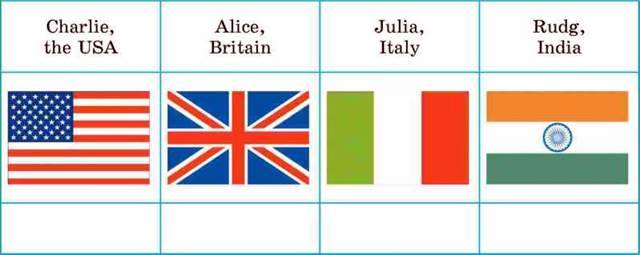
VIII. Time to Write
Look at the set of pictures and write your story about the children’s after-school activities. Give your story a title or present it to the class.
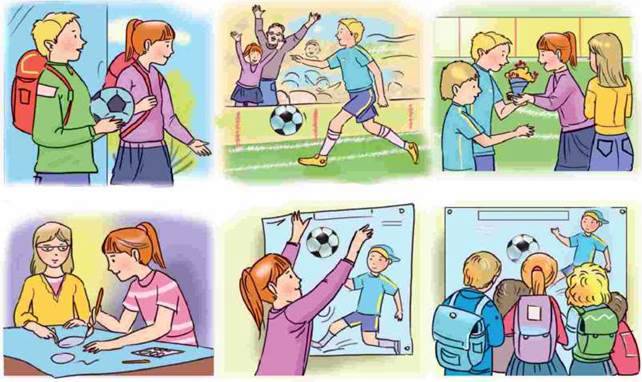
Go to Ex. 51, 52 of your Workbook